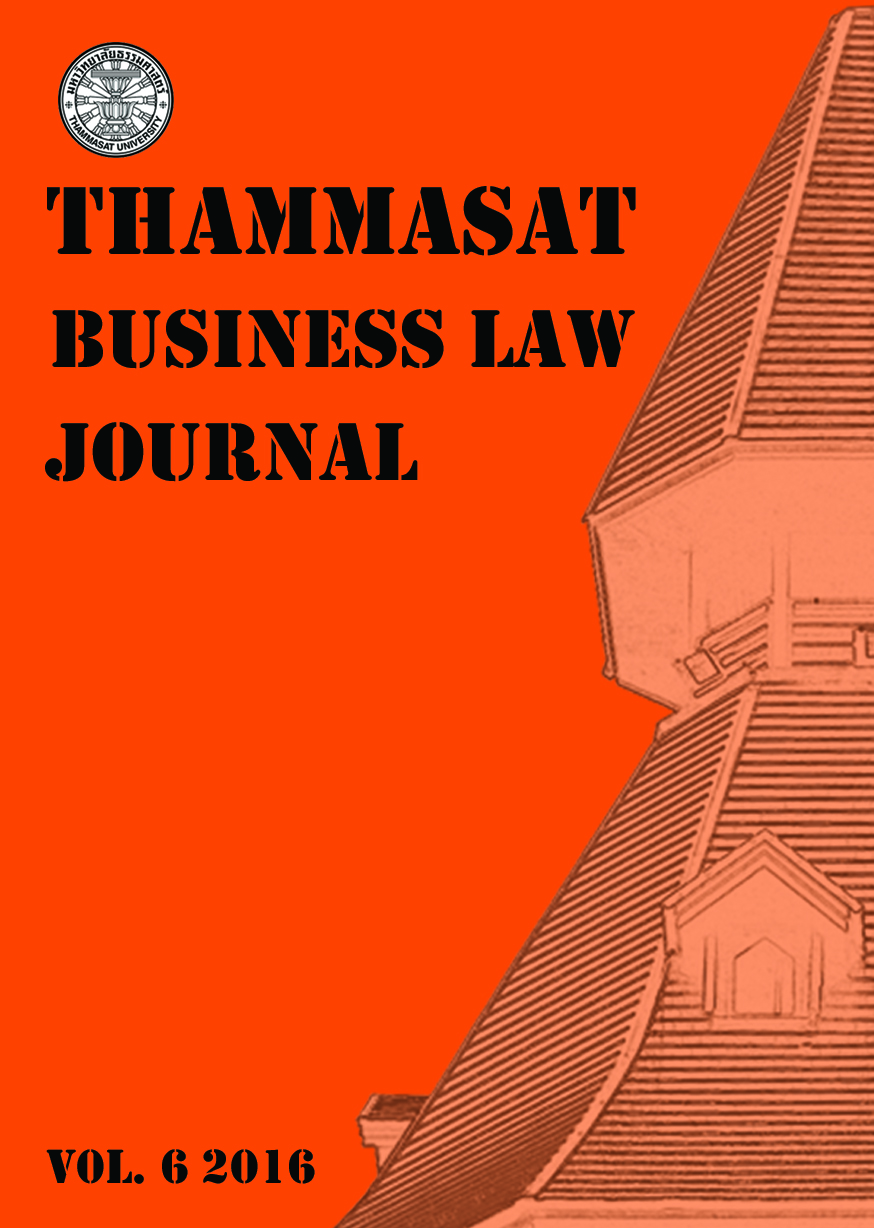THE RIGHT TO BE FORGOTTEN UNDER THAI LAW
Main Article Content
Abstract
One of the essential parts in human dignity is reputation, and nowadays the too-much speech can tear down the individual’s privacy. Normally, there are two well-known rights under the privacy involved with this digital age, i.e. right of free expression and right to access information, but recently the right to be forgotten has been recognized as one of the privacy rights. Technically, the right occurs to solve a problem in the digital age because it is very difficult to bury the individual’s past in the online world.
In May 2014, the right to be forgotten was recognized in the European Union through, Google Inc. v Agencia Española de Protección de Datos, Google Spain case, a decision by the Court of Justice of the European Union (CJEU). Thenceforth, search engines were obliged to remove outdated or extremely personal information from search results. In some countries, the right to be forgotten has been rejected. Questions remain about the benefits of this right, seemingly based on the concept of a second chance. It is not an absolute right so it is difficult to balance this right with other related rights, especially rights of free expression and access to information.
The question was addressed whether data should be remembered forever or may be changed by owners in Thailand. European Union rulings were studied, considered among the most effective privacy- protection regulations. Rulings were issued with the objective to protect personal data, offering high protection standards. Yet in the United States, the right to be forgotten confronts the First Amendment, the Communications Decency Act of 1996 (CDA) and privacy tort law. In the United States, the legal right to be forgotten has less weight than other fundamental rights. Recommendations were offered to enhance effectiveness of adopting the right to be forgotten under Thai Law.
Article Details
References
The Manila Principles on Intermediary Liability Background Paper, Version 1.0,
(May 30, 2015).
Andrew P. Bolson, Esq., “Flawed But Fixable: Section 230 of the Communications Decency Act”, (2013).
“Forcing Europe to Wear the Rose- Colored Google Glass: The “Right to Be Forgotten” and the Struggle to Manage Compliance Post Google Spain”, Columbia Journal of Transnational Law, (2016).
Jacques Bughin, Laura Corb James Manyika, Olivia Nottebohm, Michael Chui, Borja de Muller Barbat and Remi Said, The impact of Internet technologies: Search, (July 2011),
https://www.mckinsey.com/~/media/McKinsey/dotcom/client_service/High%20Tech/PDFs/Impact_of_Internet_technologies_search_final2.ashx, (accessed on May 29, 2016).
Jeffrey Rosen, A Grave New Threat to Free Speech From Europe, (February 10, 2012), https://newrepublic.com/article/100664/freedom-forgotten-internet-privacy-facebook, (accessed 10 November, 2015).
European Union Conditionality and the Acquis Communautaire, http://www.cesruc.org/uploads/soft/130221/1-130221113Z4.pdf?pldezynhfkbcvomf, (accessed on June 23, 2016).
CaseC‑131/12,http://curia.europa.eu/juris/document/document_print.jsf?doclang=EN&docid=152065, (accessed on March 29 , 2015).
Derechos Digitales, What are the implications of the right to be forgotten in the America,
https://www.ifex.org/americas/2015/09/22/derecho_olvido/, (accessed on September 22, 2015).
European Union, Protection of Personal Data, http://ec.europa.eu/justice/data-protection/, (accessed on October 24, 2015).
Stuart Winter-Tear, GDPR-The Right to be Forgotten, http://www.stuartwintertear.net/gdpr-the-right-to-be-forgotten/, (accessed on May 21, 2016).
Council of the European Union, Proposal for a Regulation of the European Parliament and of the Council on the protection of individuals with regard to the processing of personal data and on the free movement of such data (General Data Protection Regulation), http://www.statewatch.org/news/2015/dec/eu-council-dp-reg-draft-final-compromise-15039-15.pdf, (accessed December 15, 2015).
American Government, First Amendment Rights, http://www.ushistory.org/gov/10b.asp., (accessed on May 20, 2016).
CDA 230, https://www.eff.org/issues/cda230, (accessed October 13, 2015).
Eric Goldman, Search Engines Defeat “Must-Carry” Lawsuit–Langdon v. Google., http://blog.ericgoldman.org/archives/2007/02/search_engines_3.htm, (accessed on June 1,2016).
Krisdika, Drafted of the Personal Data Protection, Section 5, http://web.krisdika.go.th/data/news/news11804.pdf, (accessed on July 1, 2016).
สำนักงานคณะกรรมการธุรกรรมทางอิเล็กทรอนิกส์, สรุปสาระสำคัญของกฎหมายคุ้มครองข้อมูลส่วนบุคคลและประเด็นที่เกี่ยวข้องกับการคุ้มครองข้อมูลส่วนบุคคลในการทำธุรกรรมทางอิเล็กทรอนิกส์ภาครัฐ, http://www.etcommission.go.th/article-dp-topic-conclusion-dp.html., (accessed on 19 July, 2016).
The Data Protection Directive (1995).
Journal of the European Union EN, (May 4, 2016)
Restatement of the Law, Second Torts 1977 s 652 (B).
Civil and Commercial Code
Credit Information Business Act 2012 (B.E. 2545)


